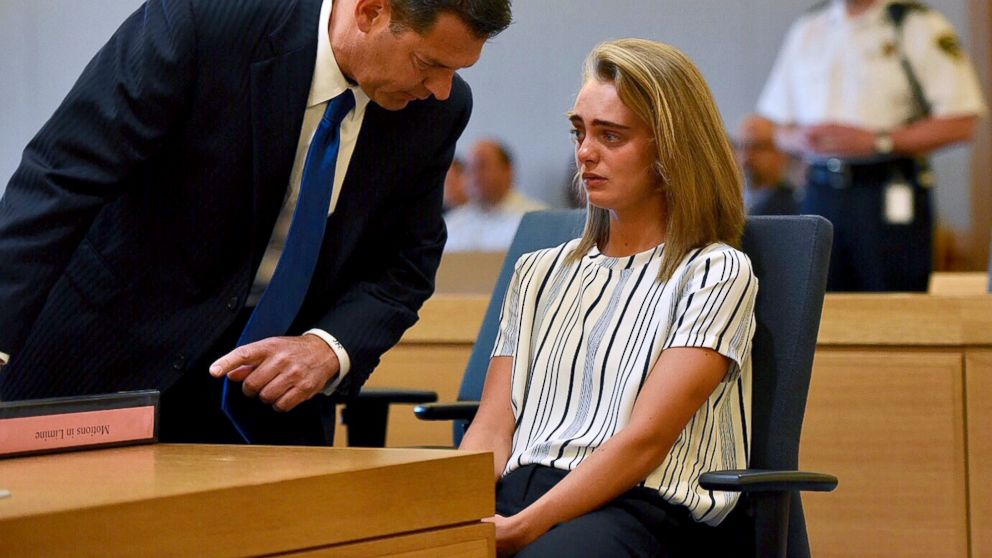Texts revealed during trial of young woman accused of encouraging 18-year-old to commit suicide
— -- Two months after Michelle Carter's 18-year-old then boyfriend Conrad Roy died of carbon monoxide poisoning after locking himself in his truck, Carter texted a classmate that "his death was my fault."
"I could’ve stopped him," Carter texted a classmate in September 2014. Carter texted that she and Roy were on the phone the day of his suicide in July when Roy "got out of the car ... he was scared."
Carter texted that she "told him to get back in."
“I couldn’t have him live the way he was living anymore," Carter texted the classmate. "I started giving up because nothing I did was helping, but I should’ve tried harder ... it’s my fault, I could've stopped him ... all I had to say was, 'I love you, don't do this' one more time, and he’d be here."
Carter, 20, is charged with involuntary manslaughter after she allegedly urged Roy to commit suicide, purportedly documented in thousands of text messages. But Carter maintains her innocence.
Her trial in Massachusetts began Tuesday with prosecutor Maryclare Flynn saying, "She used Conrad as a pawn in a sick game of life and death for attention." The testimony of several of Carter's classmates Wednesday supported the prosecution's argument that Carter didn't have many friends and pushed Roy to suicide to get more attention from the friends she was pursuing.
Prosecutors said on Tuesday that Carter, then 17, exchanged 20,000 text messages with Roy, and more than 1,000 of those were sent in the days leading up to his death.
Carter texted him that he kept "over thinking it" and "pushing it off."
"You just need to do it, Conrad," she wrote.
The defense argued that Carter had tried before to talk Roy out of harming himself and the defense pointed to a conversation where Roy told Carter he regretted dragging her into his plans to kill himself.
"It is not a homicide," lawyers for Carter said. "The evidence of the texting is overwhelming that Conrad Roy was on this path to take his own life for years."
During cross-examination Wednesday, Fairhaven Police Detective Scott Gordon said Conrad Roy was communicating with someone in Great Britain about suicide.
The defense added, "Even if somebody supports another individual in a suicide, it doesn’t create a homicide."
Meanwhile, the prosecution said, "She ... assured him that his family would understand why he did it. She researched logistics and reassured him that he was likely to succeed."
According to prosecutors, Carter urged him to go to the parking lot where he eventually would die and texted, "You are ready and prepared, all you have to do is turn on the generator and you will be free and happy."
Prosecutors added that Carter displayed frustration and anger when Roy delayed the plan, and that she "ordered him back and then listened as he cried, took his last breath."
On July 12, 2014, the day of Roy's suicide, Carter texted a classmate, "He just called me and there was a loud noise like a motor ... I heard moaning ... I stayed on the phone for like 20 minutes and that’s all I heard. ... I think he just killed himself."
On July 14 Carter texted a classmate, "I do blame myself, it's my fault. I was talking to him while he killed himself."
On July 21 Carter texted a classmate that Roy's mother told her that detectives were going through Roy's belongings. "They have to go through his phone and see if anyone encouraged him to do it," Carter texted. "I’m done. His family will hate me and I could go to jail."
The defense on Tuesday said Carter struggled with her own depression and her attorney blamed her behavior on the medications she was taking.
Conrad Roy's mother, Lynn Roy, was tearful on the stand Tuesday as she explained the state of her son's mental health.
"I knew he was a little depressed but I thought ... he was doing great. I mean, he just graduated from high school, got his captain’s license and I thought everything was moving forward, not backward," she said.
Conrad Roy's then-13-year-old sister testified that she received a text on the day of his death from Carter that read, "Find him yet?" She also said that just two days before his funeral, Carter asked for some of his ashes.
Carter waived her jury trial, leaving her fate in the hands of the judge.
If convicted Carter could face 20 years in prison.
ABC News' Doug Lantz and Will Gretsky contributed to this report.




